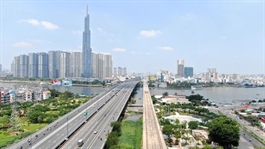Wage proposal made to facilitate upswing
Wage proposal made to facilitate upswing
Vietnam may break a 10-year trend by not increasing regional minimum wages for private businesses in 2021 to help ease the financial burden on those ailing from the pandemic.

A higher minimum wage could increase costs for businesses, photo Le Toan
|
With nine of the 13 members voting in favour, the National Wage Council will propose the government not to increase the regional minimum wage in 2021, with the opinion of the representative of the Vietnam General Confederation of Labour attached. The final decision will depend on the pandemic situation and socioeconomic development.
The proposal has received the thumbs-up from the business community which is currently struggling to deal with COVID-19 impacts. After being forced to reduce production capacity, numerous companies such as Panasonic are still hard-pressed to maintain their facilities’ operations.
According to Morita Ken, director of HR, Planning, Legal, Corporate Communication, and IT at Panasonic Vietnam, the business community welcomed the possible plan on halting the pay rise, adding that consecutive annual raises in past years have been tormenting many of them.
“Compliance with local regulations, including the minimum wage, is our first priority when doing business in Vietnam. However, companies are facing plenty of problems due to the pandemic including shrinking sales as orders drop, mounting inventories, bank interests, and storage costs. More importantly, none of us know when the situation will improve. Panasonic is not an exception to this situation,” Ken told VIR.
“Simply keeping employment and wages steady is already a great effort for employers – a higher minimum wage would increase fixed costs and make it even harder on companies,” he added.
When talking about Panasonic’s woes, Ken gave voice to the general concerns of Japanese-invested enterprises in Vietnam, which are not eager to see yet another rise in regional minimum wages.
Dao Thu Huyen, representative of the Japan Chamber of Commerce and Industry in Vietnam, said that numerous Japanese-invested enterprises have had to reduce operations as the majority of their manufacturing and trade depends on exports. In addition, they are concerned about new waves of the pandemic, which will only exacerbate their current difficulties.
According to Huyen, minimum wages and related adjustments aim to guarantee a minimum quality of life for local employees. Wage increases in recent years, however, have put a burden on both employers and employees. In the context of growing difficulties, not even salary hikes can help employees sustain their living standards and only places more burdens on employers. Ultimately, enterprises cannot realise the purpose of benefiting employees by this salary increase.
According to Ken, in the case of Panasonic’s employees, after the deduction of standard living expenses, Panasonic expects that its employees can still put some of their earnings away as savings or investment.
“Currently, we raise salaries on an annual basis but due to a rise in prices, the increase evaporates and does not help to improve our employees’ lives. Meanwhile, our fixed costs have increased a lot, which had a distinct negative impact on our business,” Ken said.
A survey implemented by the Vietnam Chamber of Commerce and Industry in April showed that 82 per cent of questioned businesses were concerned about a plunge in revenues compared to 2019. Some 30 per cent of surveyed businesses forecast that in 2020 their revenues will decline by 30-50 per cent on year, while 22 per cent said the decrease would be over 50 per cent.
Many are running out of money to pay employees. As of June 10, the National Public Service Portal – the electronic platform connecting the government with individuals and enterprises – received over 660 dossiers from 227 enterprises applying for interest-free loans to pay wages for employees who had to stop working due to the pandemic. However, only nine of the dossiers were approved.
Truong Van Cam, vice chairman of the Vietnam Textile and Apparel Association, also said that without exception, all garment and textile enterprises have been impacted by the pandemic. In the first five months of this year, companies reported average negative growth due to a lack of materials, as well as a plunge in the demand of large markets.


























